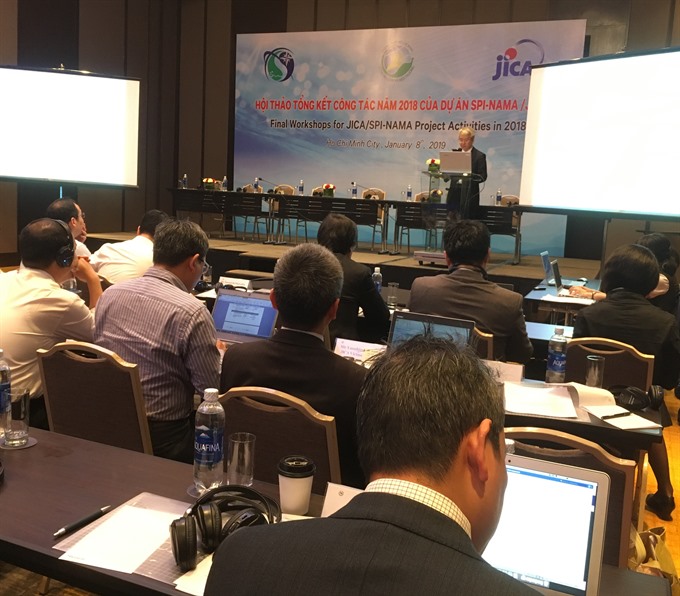 Society
Society

" />A work plan for 2019 to help HCM City review its climate change policies and update action plans was agreed at the final workshop of a Japan International Cooperation Agency technical co-operation project.
 |
| The final workshop of the Japan International Cooperation Agency’s technical co-operation project on supporting HCM city in developing climate policies was held on January 8. –Photo Courtesy of JICA |
HCM CITY– A work plan for 2019 to help HCM City review its climate change policies and update action plans was agreed at the final workshop of a Japan International Cooperation Agency technical co-operation project.
The project, to “support the planning and implementation of nationally appropriate mitigation actions in measurement, reporting and verification procedures” (SPI-NAMA) in HCM City, aids preparations for a new climate change action plan focusing on building energy efficiency, strengthening the capacity of the city for GHG inventory development and considering low-carbon technology for the transport sector.
At the workshop, the city’s Department of Natural Resources and Environment and Japanese experts reported the results of their technical work done in 2018 under the HCM City component.
Within the scope of the SPI-NAMA, since early 2018 the Japan International Cooperation Agency (JICA) has increased co-operation with the city.
The activities in HCM City during 2018 contributed to preparations for upstream policies in the local context and provided practical lessons learnt for further advancing its policy goals.
For example, a joint study by the city and JICA identified large greenhouse gas (GHG) mitigation potential by building energy-efficient buildings and recommending further actions based on the good practices of Tokyo city.
Support for developing a city-level GHG inventory with quality assurance under the project provides sound scientific evidence for establishing a mitigation target in future.
A study of seaports also showed potential for GHG reduction and economic benefits, and provided a framework for monitoring reporting and verification to be replicated in other areas.
Jun Ichihara, chief advisor to the SPI-NAMA project, said the planned activities would focus on estimating future GHG emission trends and emission reduction potential in the city by applying a model developed by Japanese research institutions and universities, determining priority mitigation programmes and actions and analysing policy options to promote the programmes and actions.
Murooka Naomichi, senior representative at the JICA Vietnam Office, said: “With the current frequent flooding [in the city], which has become more serious due to climate change impacts such as sea level rise, the city government needs to take action to safeguard the city and its people.
“It is essential that the city continues to provide strong leadership as a role model for other municipalities and provinces in Việt Nam for sharing best practices and lessons learnt on strong climate policies.”
Furthermore, the city’s experience will be reflected by the Ministry of Natural Resources and Environment in its future policies to empower non-state stakeholders in implementation of the Paris Agreement.
The workshop yesterday was organised by the Ministry of Natural Resources and Environment, the city Department of Natural Resources and Environment and JICA.—VNS




